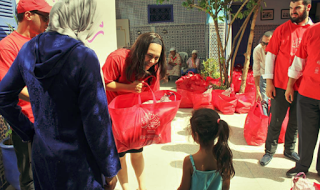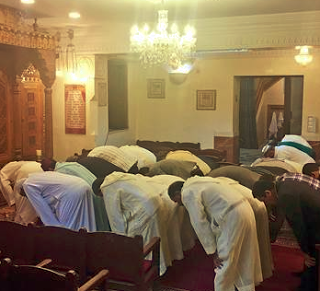
In a well-publicised interfaith initiative in June, Jews and Muslims sat down together in Morocco to mark Iftar, the end of the month of Ramadan. In contrast to the gushing account by Yael Eckstein (‘Why do Moroccans treat Jews so well? she kept asking) Here is a more nuanced report on NBC News of the complex relationship between the two communities. (With thanks: Tom) 
Yael Eckstein, the VP of the International Fellowship of Christians and Jews, hands a child a bag full of food for Ramadan (Yardena Schwartz/ NBC News)
Today, Jews account for less than 3,000 of Morocco’s 35 million residents — a small fraction of the nearly 300,000 who lived here before the establishment of Israel in 1948. Still, that tiny figure makes Morocco home to the largest Jewish population in the Arab world. And unlike other Arab countries, which essentially expelled their Jewish communities around the time of Israel’s establishment, the Jews of Morocco were not forced out when Israel declared its independence.
To be sure, there were isolated cases of violence against Jews in Morocco during this time. For example, in June 1948, two days of anti-Jewish rioting killed 44 people and wounded some 60 others. Still, attacks on the Jewish community were mild compared to other Arab countries. In Iraq, Egypt, Yemen, Algeria and Libya, for example, government-sanctioned anti-Jewish policies led once-large Jewish communities to dwindle to zero. One of the most infamous attacks occurred in Iraq before Israel’s establishment, in June 1941, when over 900 Jewish homes were destroyed and 180 Jews were killed, including women and children, in a gruesome pogrom known as the Farhud.
Muslims pray in the Bet El synagogue in Marrakesh before breaking their Ramadan fast at the Iftar meal
“Jews in Morocco saw the writing on the wall,” said Robert Satloff, director of the Washington Institute for Near East Policy, who spent two years living in Morocco while researching his book, “Among the Righteous: Lost Stories of the Holocaust’s Long Reach into Arab Lands.” There was plenty of anti-Jewish sentiment in Morocco at the time, said Satloff, but compared to Jews in other Muslim-majority countries, the Jews of Morocco were relatively better off. “They weren’t stringing Jews from street posts like they were in Iraq.”
Most of Morocco’s Jews, he said, left not because they were expelled, but because they felt a growing sense that they had no future there. Morocco was under French and Spanish rule until 1956, and as the Arab nationalist movement gained momentum, hostility toward Jews increased, he said, leading the vast majority of Morocco’s Jews to move to Israel, France and Canada. “It was really this mix of feeling like there’s no future for us in Morocco, and knowing we have a homeland to go to,” he said, referring to Israel. Yet despite the forces of Arabization and anti-Israel sentiments that gripped Morocco half a century ago, today Morocco is the only Arab country whose leader actively protects its Jewish community, said Satloff.
André Azoulay is a Jewish senior adviser to the king of Morocco, Mohammed VI. He also served his father, King Hassan II. Explaining how Morocco has remained protective of its Jewish community despite the anti-Jewish sentiments that overtook other Muslim countries in the wake of Israel’s establishment, Azoulay said, “We are fighting for that. But it’s not just top down,” he said, referring to the king’s protection of the community. “It’s also bottom up. Judaism in Morocco is in the roots, the identity, the mindset of the Moroccan people. Indeed, in 2011 Judaism became enshrined in the nation’s constitution as a facet of Moroccan identity.
Azoulay cautioned against painting a sweeping brush of anti-Semitism across the Muslim world. After all, Arabs are a Semitic people as well, with Hebrew and Arabic sharing the same roots.


Leave a Reply